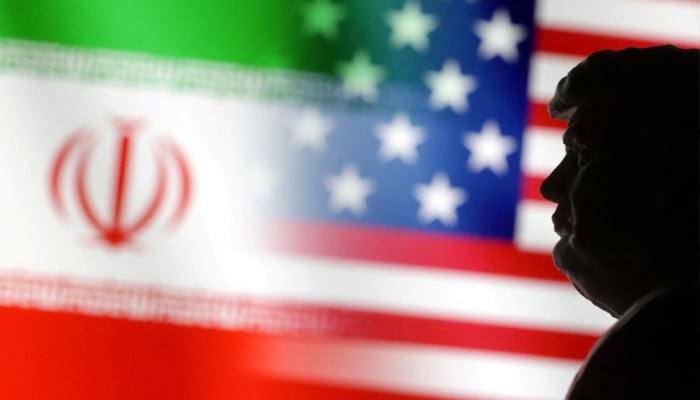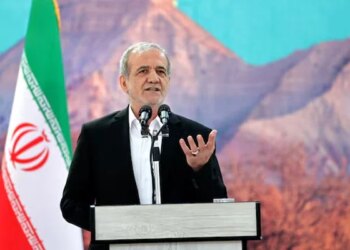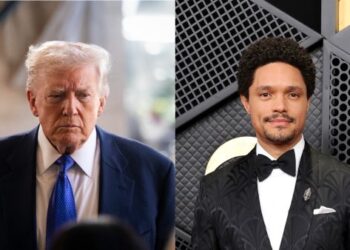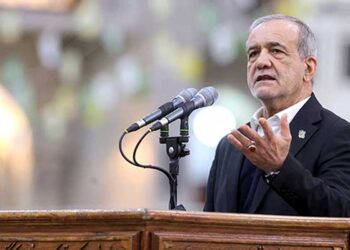Select Language:
- President Trump warns of significant risk if nuclear negotiations falter.
- Direct discussions hinge on the explicit consent of Supreme Leader Khamenei.
- Iran maintains its nuclear agenda is strictly for peaceful purposes.
In a surprising revelation on Monday, President Donald Trump stated that the United States and Iran are on the verge of initiating direct discussions regarding Tehran’s nuclear program. However, Iran’s foreign minister clarified that these talks would be conducted indirectly in Oman.
As an indication of the complexities surrounding an agreement between these two rivals, Trump issued a firm warning: if the negotiations fall through, “Iran will find itself in serious peril.”
In recent weeks, Iran has resisted Trump’s demands for direct negotiations about its nuclear development, asserting its stance once again on Monday.
“We’re engaging in direct talks with Iran, and they have commenced. A major meeting is scheduled for Saturday, and we will see what transpires,” Trump informed reporters during his meeting with Israeli Prime Minister Benjamin Netanyahu in the Oval Office.
“I believe there is a consensus that reaching an agreement would be advantageous,” Trump added, noting that the discussions with Iran would involve high-level representatives, although he kept the specifics vague regarding the location of the talks.
Iran’s Foreign Minister, Abbas Araqchi, confirmed on the platform X that indirect and high-level discussions would take place in Oman, stating, “This is as much an opportunity as it is a test. The next move is up to America.”
Under former President Joe Biden, the U.S. attempted indirect negotiations with Iran but achieved minimal breakthroughs. The most recent direct conversations occurred during President Barack Obama’s administration, which led to the 2015 international nuclear agreement that Trump subsequently abandoned.
Trump’s threats of military action against Iran have heightened anxieties throughout the Middle East, especially following recent conflicts in the region and leadership changes in Syria.
Since his inauguration in January, Trump has strengthened the U.S. military’s presence in the region and has expressed a preference for a diplomatic resolution over military confrontation. On March 7, he indicated that he had reached out to Supreme Leader Ayatollah Ali Khamenei to propose negotiations.
However, Iranian officials have stated they will not be coerced into discussions.
“Iran cannot obtain a nuclear weapon, and if the talks fail, it will indeed be a dark day for Iran,” Trump remarked during his Oval Office meeting on Monday.
Direct negotiations would not proceed without Khamenei’s explicit consent, who, in February, declared that negotiations with the U.S. were “neither wise nor honorable.”
Iran Prefers Indirect Negotiations
Just hours ahead of Trump’s announcement, Iranian Foreign Ministry spokesman Esmail Baghaei remarked that Iran awaited a response from the U.S. regarding Tehran’s proposal for indirect talks, asserting that the Islamic Republic had made a fair and mature offer.
Following Trump’s comments, a senior Iranian official, choosing to remain anonymous, told Reuters: “The talks will not be direct… They will involve Oman’s mediation.” Oman has a history of maintaining strong relations with both the U.S. and Iran and has served as a communication channel for the two nations.
Iran’s Nournews, linked to the country’s top security agency, referred to Trump’s announcement about a direct meeting as a “psychological maneuver designed to shape public opinion domestically and internationally.”
Another unofficial source from Iran suggested that there might be a two-month window to finalize an agreement, citing concerns that the long-time adversary Israel might engage in military action if deliberations continue for too long.
Netanyahu, who has expressed skepticism toward any U.S.-led negotiations with Iran, conveyed that if diplomacy could effectively prevent Iran from obtaining nuclear weapons “in a comprehensive manner, similar to the way it was achieved in Libya, it would be beneficial.”
During his term from 2017 to 2021, Trump pulled the U.S. out of the landmark 2015 agreement involving Iran and world powers aimed at limiting Iran’s nuclear capabilities in exchange for sanction relief, reimposing extensive sanctions afterwards.
Since then, Iran has significantly breached the original limits set on its uranium enrichment levels.
Western nations allege that Iran harbors a secret ambition to develop the capability to produce nuclear weapons by enriching uranium beyond what is deemed necessary for a civilian energy program.
Iran, however, insists that its nuclear endeavors are entirely focused on civilian applications.
The White House National Security Council has yet to respond to requests for more information.
The instability following the fall of Syrian President Bashar al-Assad, a crucial ally of Iran, has further diminished the Islamic Republic’s regional influence.







